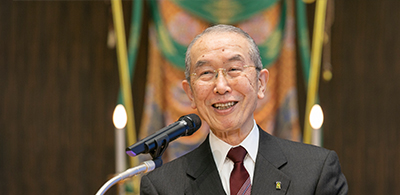Complaining in Moderation
November 2023

“Complaining” Is “Knowledge Stricken by Illness”
This summer in Japan was hot enough to be considered a natural disaster. But, even if that were not the case, we tend to complain, every time we open our mouths, about summer being hot and winter being cold. Generally speaking, “complaining” means expressing despair about things that are beyond the control of human beings, such as natural phenomena, past events, and so on. What sorts of things come to your mind when you hear the phrase, “expressing despair about something that is beyond the control of human beings”?
While the variety of complaints in daily life is itself interesting, it is the components of the second character chi [痴] of the Japanese word guchi [愚痴], “complaint,” that are particularly interesting to me. The character chi [知], “knowledge,” means the ability to understand and make decisions about things, and includes the intellect and wisdom that supports that process. But when this “knowledge” [知] is surrounded by yamaidare [疒], “illness,” it becomes “foolishness” [痴]. In other words, “complaining” can be interpreted as “knowledge stricken by illness.”
Of course, we human beings are defined by being equipped with the intelligence to think and act. Doctor of Science Haruo Saji (b. 1935) says that although human beings are made of the same basic elements that make up the universe, such as hydrogen and carbon, they are not physical objects, but rather, “amazing beings who think for themselves, act on their own, share their feelings, and coexist by helping each other” (Juyonsai no tame no jikanron [Time theory for fourteen year olds], Shunjusha, 2012). He says that “this is because human beings have the ability to imagine and speculate about the future and other people”—in other words, because we have minds.
However, with those same minds, we allow our self-centered desires and anger to mount, and we repeat the foolish actions that cause suffering to ourselves and others. The disease of complaining attacks the mind. So, what should we do to prevent our self-centered desires and anger from spiraling out of control? What is the key to curing the disease of complaining?
Lend an Ear to Others’ Complaints
Please call to mind Dr. Saji’s words, which I just mentioned. We have the ability to cooperate with others, to be considerate of others, and to imagine and speculate about the future. So, all we have to do is put our abilities to use. When you feel like your selfish mind is about to emerge, try to look at things from several different angles and reflect on what other people have in mind. Or, as the Nirvana Sutra says, “Teach the truth of dependent origination to the disease of complaining”: know that you are being caused to live by all existence, and try to expand that image. If, thereby, you can live a life of even a little bit more gratitude, your complaints will naturally decrease.
Speaking from the perspective of dependent origination, research shows that if parents in the home are always complaining or speaking ill of others, they cause their children to also complain more about things. Are we the cause of arousing the complaints of those around us, or are we the cause of awakening their wisdom? Depending on the state of our minds, we can have a different influence on those around us.
However, if you are never allowed to complain about anything, that may make you feel stifled. While you should not let greed or anger get the better of you, at times it may be necessary to complain in frustration or whine out of a sense of helplessness. Complaining may eventually become the starting point for you to realize that it is time to stop being attached to things that are beyond your control, to reconsider your situation, and to move forward with fresh feelings.
Because of this, I think it is important that we serve as receiving vessels who lend an ear to people’s complaints.
Some people may say that it is difficult to listen to complaints all the time, but let’s try to listen, considerately, to other people’s pain and help them let out their complaints. And then, while together we explore the mind of wisdom that leads to life’s breakthroughs, we will mutually foster spiritual health and vitality and refine ourselves as human beings.




